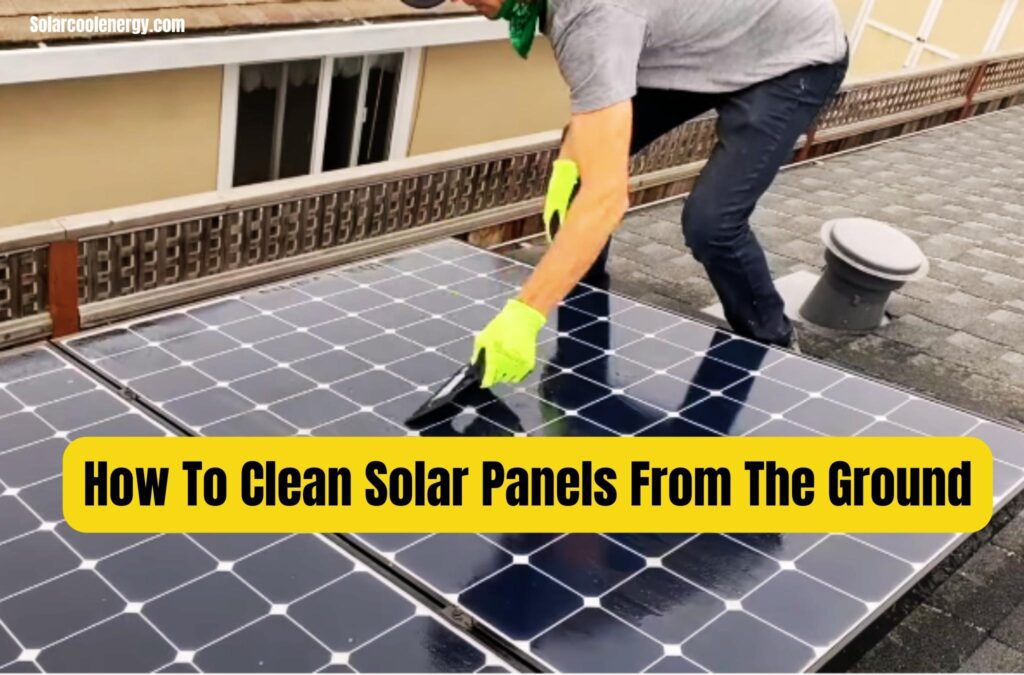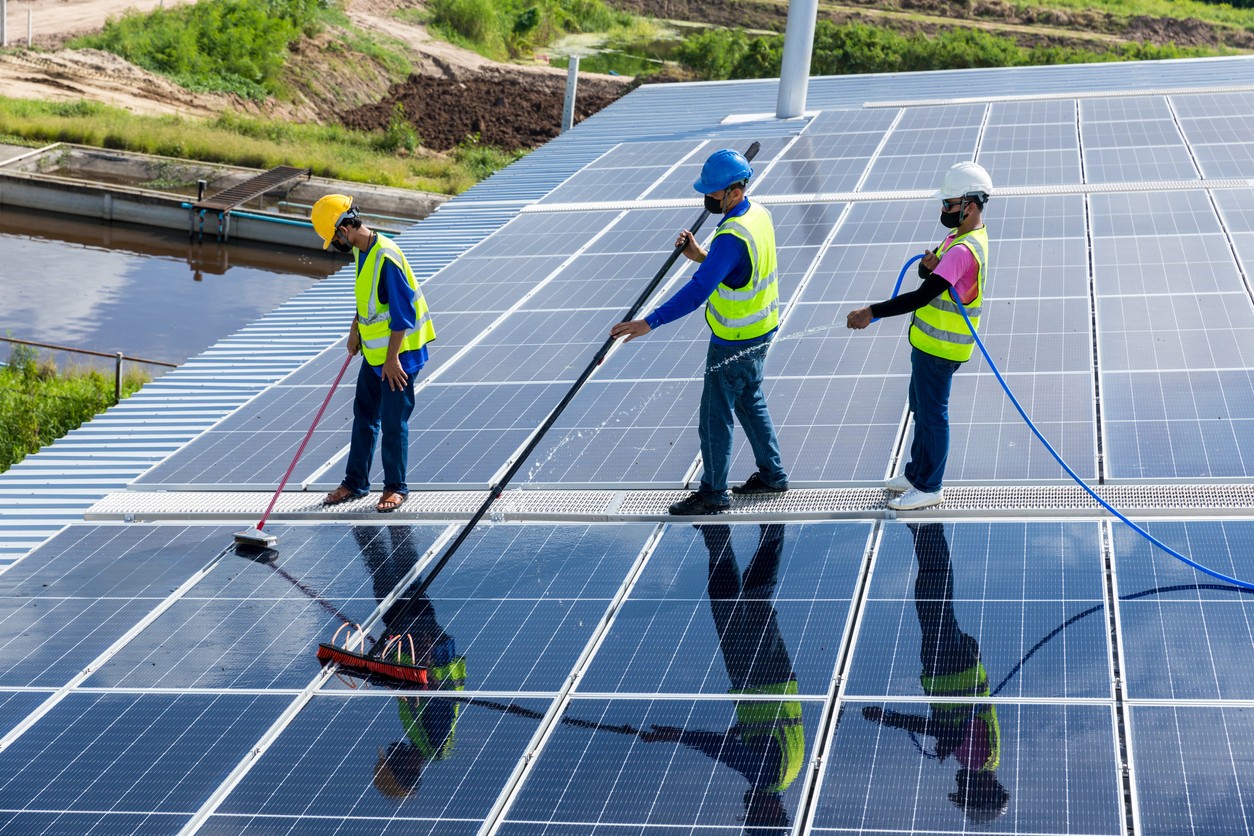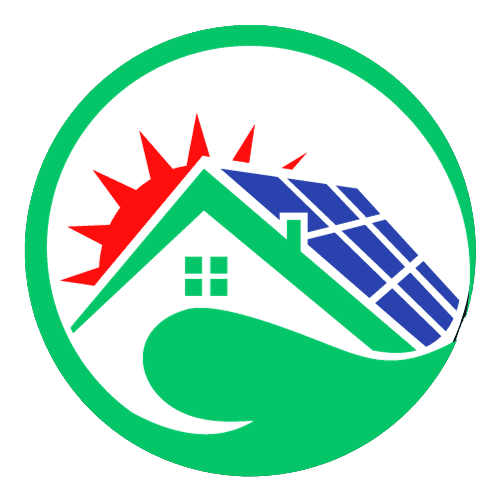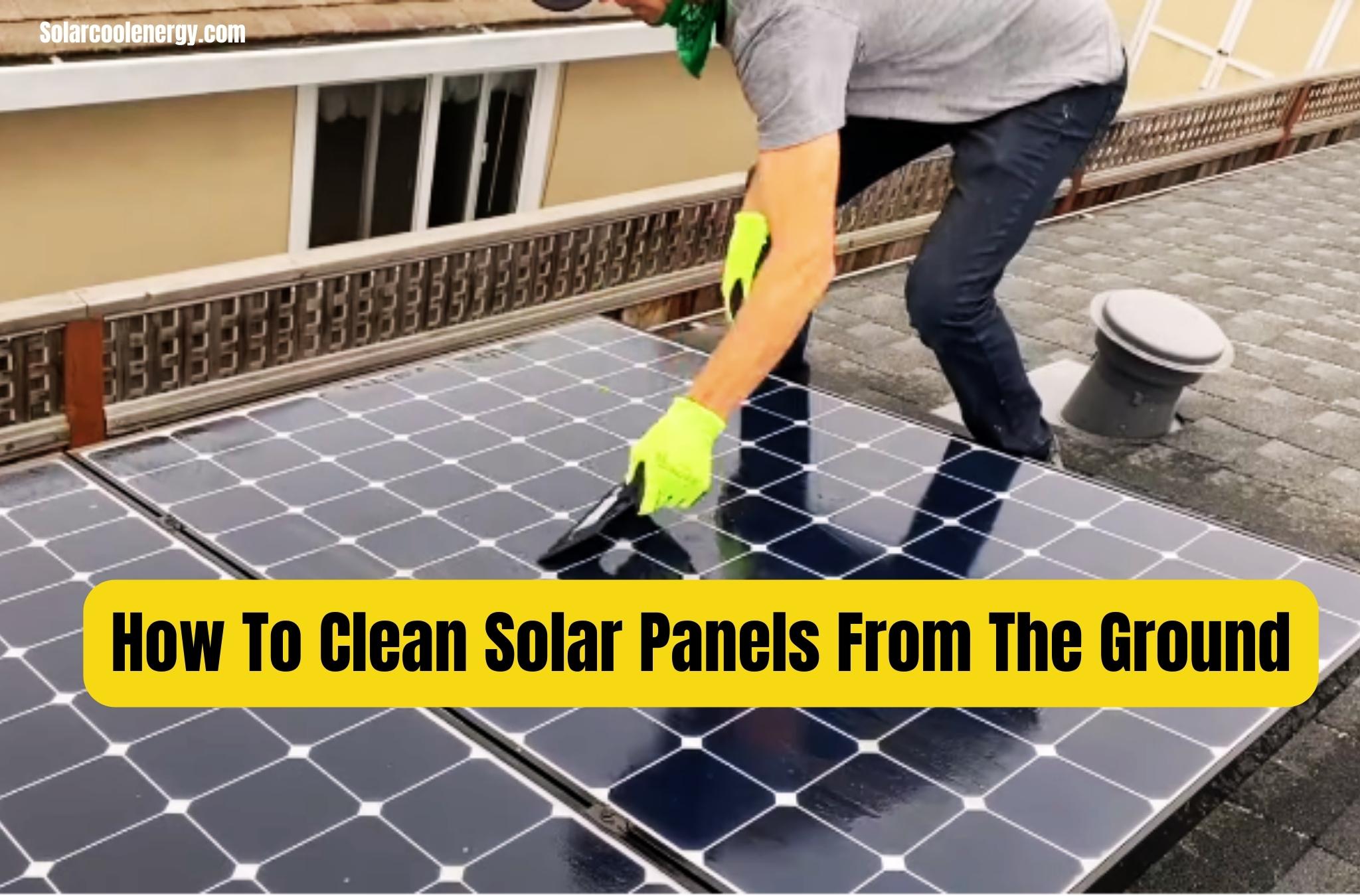To clean solar panels from the ground, use a hose to rinse off the panels and remove light dirt and dust. This method is safe, easy, and cost-saving, improving the performance of your solar energy system.
It is recommended to use a good-quality soft brush and a squeegee with a plastic blade on one side and a cloth-covered sponge on the other for more thorough cleaning. Avoid using strong chemicals or pressure washers, as they can damage the panels.

Additionally, a small amount of dish soap mixed with warm water can be used for stubborn areas, followed by scrubbing with isopropyl alcohol. It is important to use caution and sparingly use any soap to prevent damage to the panel surfaces.
Why Cleaning Solar Panels Is Important
Proper maintenance and regular cleaning of solar panels are crucial for maximizing their efficiency and prolonging their lifespan. When dirt, dust, leaves, and other debris accumulate on the surface of solar panels, they obstruct sunlight from reaching the photovoltaic cells, which hinders the panels’ ability to convert sunlight into electricity. In turn, this can significantly reduce their energy production.
Increase Energy Efficiency
Regularly cleaning your solar panels helps to improve their energy efficiency. By removing dirt, dust, bird droppings, and other debris that accumulates on the surface, you can ensure that the maximum possible sunlight is reaching the solar cells. This allows the panels to generate more electricity, ultimately leading to higher energy output and increased savings on your energy bills.
Maintain Optimal Performance
Ensuring the cleanliness of your solar panels is essential for maintaining their optimal performance. By keeping the panels free from dirt and debris, you prevent any shading that can occur, which can significantly impact their productivity. Clean solar panels allow for unobstructed sunlight absorption, which means that the panels can operate at their full potential and continue to provide you with clean, renewable energy.
Prolong Lifespan
Regularly cleaning your solar panels from the ground can help to prolong their lifespan. If dirt, grime, or other particles are left to accumulate on the panels over time, they can cause damage or corrosion to the surface. This can lead to a decrease in performance and potentially expensive repairs or replacements. By maintaining a clean and well-maintained solar panel system, you can extend its lifespan and ensure it continues to generate electricity efficiently for many years to come.

Credit: www.youtube.com
Best Practices For Cleaning Solar Panels
Solar panels are an investment that requires proper maintenance to ensure optimal performance and longevity. Regular cleaning of solar panels is essential to remove dirt, dust, and debris that can reduce their efficiency. In this article, we will discuss the best practices for cleaning solar panels from the ground, ensuring safety, and maximizing their energy output.
Safety Precautions
Before you start cleaning your solar panels, it is important to take necessary safety precautions to protect yourself and the panels. Follow these guidelines to ensure a safe cleaning process:
- Ensure that the solar panels are not energized during the cleaning process.
- Turn off the system or follow any specific guidelines provided by the manufacturer.
- Wear appropriate personal protective equipment (PPE) such as gloves and safety glasses.
- Do not use abrasive cleaning materials or harsh chemicals that can damage the surface of the panels.
- Use a stable ladder or a sturdy telescopic pole to access the panels safely.
- Check the weather conditions and avoid cleaning during strong winds or extreme temperatures.
When To Clean Solar Panels
Cleaning solar panels on a regular basis is crucial to maintain their efficiency. However, it is important to understand when cleaning is necessary. Here are some indicators that your solar panels may need cleaning:
- Visible dirt, dust, or bird droppings on the surface of the panels.
- A noticeable decrease in the energy production of your solar system.
- If you live in an area with high pollution or frequent rainstorms, more frequent cleaning may be required.
Tools And Equipment Needed
Having the right tools and equipment is essential for an effective and efficient cleaning process. Here are the tools you will need to clean your solar panels:
| Tools | Equipment |
|---|---|
| Soft brush or sponge | Hose with a spray nozzle |
| Dish soap or mild cleaning solution | Telescopic pole |
| Microfiber cloth or squeegee | Bucket |
It is important to use a soft brush or sponge to avoid scratching the surface of the solar panels. A hose with a spray nozzle will provide the necessary water pressure for cleaning. Using a mild cleaning solution or dish soap mixed with water will help remove stubborn dirt or stains. A telescopic pole will allow you to reach the panels from the ground without the need for a ladder.
By following these best practices for cleaning solar panels, you can ensure their optimal performance and prolong their lifespan. Remember to prioritize safety and use the right tools and techniques to maintain the efficiency of your solar system.

Credit: www.youtube.com
Step-by-step Guide To Cleaning Solar Panels From The Ground
Cleaning your solar panels regularly is essential to maintain their efficiency and ensure maximum energy production. While cleaning solar panels from the ground may seem challenging, it can be done successfully with the right techniques and precautions. In this step-by-step guide, we will walk you through the process of cleaning solar panels from the ground, ensuring they stay in optimal condition.
Assessing The Condition Of Solar Panels
Before starting the cleaning process, it’s important to assess the condition of your solar panels. Take a close look and inspect for any visible damage, cracks, or loose connections. Additionally, check for dirt, dust, debris, and bird droppings that may have accumulated on the surface. Identifying any potential issues beforehand will help you determine the level of cleaning required.
Preparing For The Cleaning Process
Prior to cleaning the solar panels, make sure to take the necessary precautions to ensure your safety and the effectiveness of the cleaning process. Here are some steps to follow:
- Turn off the solar panel system and disconnect it from the power source to avoid any electrical accidents.
- Choose the right time of day to clean the panels. Mornings or evenings, when the sun is not at its peak, are ideal to prevent rapid evaporation of the cleaning solution and reduce the risk of streaks or residue.
- Gather the required cleaning tools and materials, such as a soft brush, a non-abrasive sponge, a bucket, a hose with a gentle nozzle, mild dish soap, and clean, lint-free towels or microfiber cloths.
- Ensure your own safety by using a stable ladder or an extendable pole with a brush attachment to reach the panels from the ground. Take proper precautions to avoid slipping or falling.
Cleaning Techniques And Methods
When cleaning solar panels from the ground, it’s important to use the right cleaning techniques to avoid causing any damage. Follow these steps:
- Begin by rinsing the panels with a gentle flow of water from the hose to remove loose dirt and debris.
- Prepare a cleaning solution by mixing mild dish soap with warm water in a bucket. Avoid using harsh chemicals as they can damage the panel surface.
- Dip the soft brush or non-abrasive sponge into the cleaning solution and gently scrub the surface of the panels in circular motions.
- Pay extra attention to any stubborn dirt or bird droppings, using mild pressure to avoid scratching the panels.
Rinsing And Drying The Panels
After scrubbing the panels, it’s crucial to rinse off any soap residue to prevent streaks and maintain panel performance. Follow these steps:
- Rinse the panels thoroughly with clean water from the hose, ensuring all soap residue is washed away.
- Inspect the panels for any remaining dirt or streaks. If needed, repeat the cleaning process until the panels are spotless.
- Use clean, lint-free towels or microfiber cloths to dry the panels gently. Avoid using abrasive materials or rubbing forcefully to prevent scratches.
Post-cleaning Maintenance Tips
Once the cleaning is complete, there are a few maintenance tips to keep in mind to ensure the longevity and optimal performance of your solar panels. Consider the following:
- Regularly monitor your solar panels for any signs of dirt or damage. Cleaning them every three to six months is recommended, though the frequency may vary depending on the climate and environmental conditions in your area.
- Keep the surrounding area clean and free from debris that may collect on the panels and inhibit their efficiency.
- Avoid using abrasive materials, high-pressure washers, or harsh chemicals that can cause damage to the panel surface.
- Consult with a professional if you notice any significant damage or if you have any concerns about the performance of your solar panels.
By following this step-by-step guide, you can effectively clean your solar panels from the ground and ensure their longevity and optimal energy production. Remember to prioritize safety and precautionary measures while performing any maintenance on your solar panel system. Regular cleaning and maintenance will contribute to maximizing the benefits of clean, renewable energy.
Common Mistakes To Avoid When Cleaning Solar Panels
Cleaning solar panels from the ground is a cost-saving and effective way to improve energy performance. Use a hose to rinse off any light dirt or dust, and then gently scrub with a soft brush and a mixture of dish soap and water for stubborn areas.
Remember to avoid using strong chemicals that can damage the panels’ surface.
Using Abrasive Materials
One common mistake to avoid when cleaning solar panels is using abrasive materials. Solar panels have delicate surfaces that can easily be scratched or damaged by rough cleaning tools. It is important to use soft brushes, cloths, or sponges to gently remove dirt and debris from the panels. Avoid using abrasive materials such as steel wool or harsh cleaning chemicals that can cause permanent damage to the panels.
Exposing Panels To Extreme Temperatures
Another common mistake is exposing solar panels to extreme temperatures during the cleaning process. Extreme heat or cold can cause thermal stress and potentially lead to cracks or damage in the panels. It is important to choose an optimal time to clean the panels when the temperature is moderate and not excessively hot or cold.
Applying Excessive Pressure
Applying excessive pressure is another mistake to avoid when cleaning solar panels. Exerting too much force while cleaning can result in cracked glass or other damages. It is crucial to be gentle and avoid using high-pressure cleaning methods, such as pressure washers, which can potentially dislodge or damage the panels.
By avoiding these common mistakes and following proper cleaning techniques, you can ensure that your solar panels remain in optimal condition and continue to provide efficient energy production.

Credit: coldwellsolar.com
Frequently Asked Questions On How To Clean Solar Panels From The Ground
Can I Hose Off My Solar Panels?
It is not recommended to hose off your solar panels. Pressure washing or using strong chemicals can damage the components. For light dirt and dust, you can rinse off the panels with a hose from the ground. Use a soft brush or cloth with warm water and a small amount of dish soap for stubborn areas.
Avoid excessive water pressure to prevent water from getting into the components.
Can I Use Pressure Washer On Solar Panels?
Pressure washing solar panels is not recommended. High-pressure water can potentially damage the components and waterproofing of the panels. It’s best to use a hose, warm water, and a soft brush or cloth to clean solar panels. Avoid using strong chemicals that could harm the surface of the panels.
How to clean solar panels on the roof automatically?
Cleaning solar panels on the roof automatically can be a convenient option, and several solutions are available. One of the most common methods is to install an automated cleaning system. These systems typically consist of a set of nozzles or brushes that periodically clean the panels using water and sometimes a mild detergent. They are controlled by timers, sensors, or software that monitor the level of dirt on the panels. While this approach can reduce the maintenance effort, it may require an initial investment and some maintenance of the cleaning system itself.
How to clean solar panels from the ground DIY?
Cleaning solar panels from the ground can be done using a DIY approach, although it’s important to ensure safety and effectiveness. Here’s a simple method:
Gather the necessary tools:
- A long, soft-bristle brush
- A squeegee
- A hose
- A mild detergent solution (water and a small amount of dish soap)
Start by rinsing the panels with a gentle stream of water from the hose.
Scrub the panels carefully with the brush after dipping it in the soapy solution. Don’t use anything that might damage the glass, such sandpaper.
Rinse the panels thoroughly with clean water using the hose.
If any water spots or streaks remain, use the squeegee to remove them.
Repeat this process as needed, usually every few months or when you notice a decrease in energy production.
Remember to prioritize safety when cleaning solar panels from the ground, especially if your panels are installed at a significant height. Use an extension pole for the brush and exercise caution to avoid accidents.
Do I need to turn off solar panels to clean them?
To clean your solar panels, you often won’t need to have them turned off. Solar panels are designed to operate efficiently in outdoor conditions, and cleaning them should not pose a risk.
Ensure your safety while cleaning by avoiding wet surfaces and using proper equipment.
Avoid spraying water directly into electrical components.
If you have concerns about working around live electrical systems, consult a professional solar panel installer or electrician.
Turning off your solar panels during cleaning is generally unnecessary, but if you need clarification or have specific concerns about your installation, it’s best to consult with a professional.
How to clean solar panels at home?
Cleaning solar panels at home is a straightforward process. Here are the steps:
Gather your cleaning supplies: A soft brush with an extension pole, a squeegee, a hose, and a mild detergent solution.
To begin, remove any loose dirt and debris from the panels by washing them with a little spray of water from the hose.
Dip the brush into the soapy solution and scrub the panels gently. Avoid abrasive materials to prevent scratches.
Rinse the panels thoroughly with clean water using the hose.
Use a squeegee to remove any water spots or streaks.
Repeat this process periodically, typically every few months or as needed, based on the level of dirt and environmental factors.
What Kind Of Soap Do You Use To Clean Solar Panels?
To clean solar panels, use a small amount of dish soap mixed with warm water. Gently scrub the panels with a soft brush or cloth to remove debris. For stubborn areas, use isopropyl alcohol and a brush or rag. Avoid using strong chemicals as they can damage the panels.
What Solution Is Best To Clean Solar Panels?
Use a hose to rinse off the panels from the ground. For stubborn spots, use a mixture of mild dish soap and vinegar with caution. Avoid using strong chemicals that can damage the panels. Scrub with a soft brush or cloth, and rinse again with water.
Conclusion
Cleaning your solar panels from the ground is a simple and cost-effective way to maintain their efficiency. By using a hose to rinse off dirt and dust, you can improve your solar energy performance without the need for any specialized equipment.
Additionally, using a gentle dish soap and soft brush can help remove stubborn debris. Remember to exercise caution and avoid using strong chemicals that may damage the surface of the panels. Regular cleaning will ensure that your solar panels continue to generate maximum energy output.

